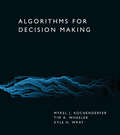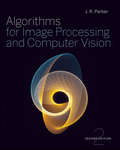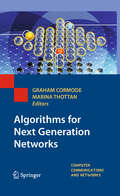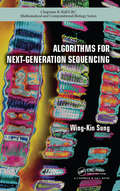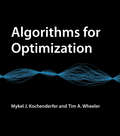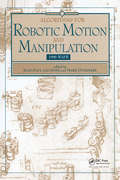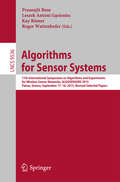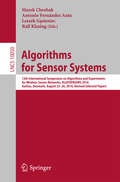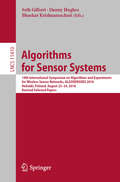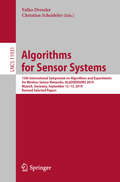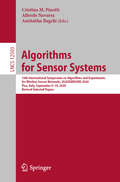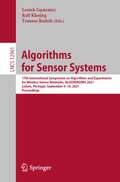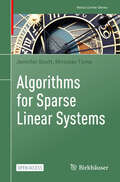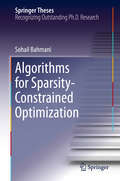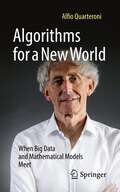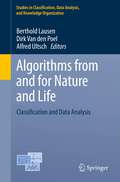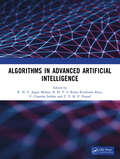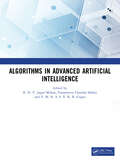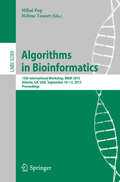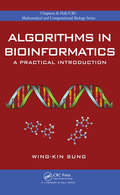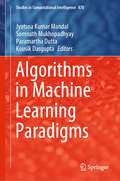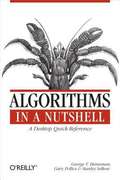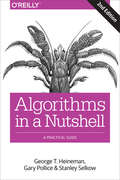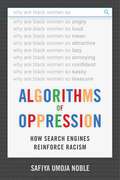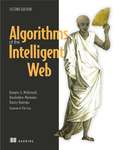- Table View
- List View
Algorithms for Decision Making
by Mykel J. Kochenderfer Tim A. Wheeler Kyle H. WrayA broad introduction to algorithms for decision making under uncertainty, introducing the underlying mathematical problem formulations and the algorithms for solving them.Automated decision-making systems or decision-support systems—used in applications that range from aircraft collision avoidance to breast cancer screening—must be designed to account for various sources of uncertainty while carefully balancing multiple objectives. This textbook provides a broad introduction to algorithms for decision making under uncertainty, covering the underlying mathematical problem formulations and the algorithms for solving them. The book first addresses the problem of reasoning about uncertainty and objectives in simple decisions at a single point in time, and then turns to sequential decision problems in stochastic environments where the outcomes of our actions are uncertain. It goes on to address model uncertainty, when we do not start with a known model and must learn how to act through interaction with the environment; state uncertainty, in which we do not know the current state of the environment due to imperfect perceptual information; and decision contexts involving multiple agents. The book focuses primarily on planning and reinforcement learning, although some of the techniques presented draw on elements of supervised learning and optimization. Algorithms are implemented in the Julia programming language. Figures, examples, and exercises convey the intuition behind the various approaches presented.
Algorithms for Image Processing and Computer Vision
by J. R. ParkerA cookbook of algorithms for common image processing applicationsThanks to advances in computer hardware and software, algorithms have been developed that support sophisticated image processing without requiring an extensive background in mathematics. This bestselling book has been fully updated with the newest of these, including 2D vision methods in content-based searches and the use of graphics cards as image processing computational aids. It's an ideal reference for software engineers and developers, advanced programmers, graphics programmers, scientists, and other specialists who require highly specialized image processing.Algorithms now exist for a wide variety of sophisticated image processing applications required by software engineers and developers, advanced programmers, graphics programmers, scientists, and related specialistsThis bestselling book has been completely updated to include the latest algorithms, including 2D vision methods in content-based searches, details on modern classifier methods, and graphics cards used as image processing computational aidsSaves hours of mathematical calculating by using distributed processing and GPU programming, and gives non-mathematicians the shortcuts needed to program relatively sophisticated applications.Algorithms for Image Processing and Computer Vision, 2nd Edition provides the tools to speed development of image processing applications.
Algorithms for Next Generation Networks (Computer Communications and Networks)
by Marina Thottan Graham CormodeData networking now plays a major role in everyday life and new applications continue to appear at a blinding pace. Yet we still do not have a sound foundation for designing, evaluating and managing these networks. This book covers topics at the intersection of algorithms and networking. It builds a complete picture of the current state of research on Next Generation Networks and the challenges for the years ahead. Particular focus is given to evolving research initiatives and the architecture they propose and implications for networking. Topics: Network design and provisioning, hardware issues, layer-3 algorithms and MPLS, BGP and Inter AS routing, packet processing for routing, security and network management, load balancing, oblivious routing and stochastic algorithms, network coding for multicast, overlay routing for P2P networking and content delivery. This timely volume will be of interest to a broad readership from graduate students to researchers looking to survey recent research its open questions.
Algorithms for Next-Generation Sequencing (Chapman & Hall/CRC Computational Biology Series)
by Wing-Kin SungAdvances in sequencing technology have allowed scientists to study the human genome in greater depth and on a larger scale than ever before – as many as hundreds of millions of short reads in the course of a few days. But what are the best ways to deal with this flood of data? Algorithms for Next-Generation Sequencing is an invaluable tool for students and researchers in bioinformatics and computational biology, biologists seeking to process and manage the data generated by next-generation sequencing, and as a textbook or a self-study resource. In addition to offering an in-depth description of the algorithms for processing sequencing data, it also presents useful case studies describing the applications of this technology.
Algorithms for Optimization
by Mykel J. Kochenderfer Tim A. WheelerA comprehensive introduction to optimization with a focus on practical algorithms for the design of engineering systems. This book offers a comprehensive introduction to optimization with a focus on practical algorithms. The book approaches optimization from an engineering perspective, where the objective is to design a system that optimizes a set of metrics subject to constraints. Readers will learn about computational approaches for a range of challenges, including searching high-dimensional spaces, handling problems where there are multiple competing objectives, and accommodating uncertainty in the metrics. Figures, examples, and exercises convey the intuition behind the mathematical approaches. The text provides concrete implementations in the Julia programming language. Topics covered include derivatives and their generalization to multiple dimensions; local descent and first- and second-order methods that inform local descent; stochastic methods, which introduce randomness into the optimization process; linear constrained optimization, when both the objective function and the constraints are linear; surrogate models, probabilistic surrogate models, and using probabilistic surrogate models to guide optimization; optimization under uncertainty; uncertainty propagation; expression optimization; and multidisciplinary design optimization. Appendixes offer an introduction to the Julia language, test functions for evaluating algorithm performance, and mathematical concepts used in the derivation and analysis of the optimization methods discussed in the text. The book can be used by advanced undergraduates and graduate students in mathematics, statistics, computer science, any engineering field, (including electrical engineering and aerospace engineering), and operations research, and as a reference for professionals.
Algorithms for Robotic Motion and Manipulation: WAFR 1996
by Mark Overmars Jean-Paul LaumondThis volume deals with core problems in robotics, like motion planning, sensor-based planning, manipulation, and assembly planning. It also discusses the application of robotics algorithms in other domains, such as molecular modeling, computer graphics, and image analysis. Topics Include: - Planning - Sensor Based Motion Planning - Control and Moti
Algorithms for Sensor Systems: 11th International Symposium on Algorithms and Experiments for Wireless Sensor Networks, ALGOSENSORS 2015, Patras, Greece, September 17-18, 2015, Revised Selected Papers (Lecture Notes in Computer Science #9536)
by Kay Römer Prosenjit Bose Leszek Antoni Gąsieniec Roger WattenhoferThis bookconstitutes revised selected papers from the 11th International Symposium onAlgorithms and Experiments for Wireless Sensor Networks, ALGOSENSORS 2015, heldin Patras, Greece, in September 2015. The 16 fullpapers presented in this volume were carefully reviewed and selected from 30submissions. The deal with algorithms analysis and problem complexity; computercommunication networks; computation by abstract devices; and mathematics ofcomputing.
Algorithms for Sensor Systems: 12th International Symposium on Algorithms and Experiments for Wireless Sensor Networks, ALGOSENSORS 2016, Aarhus, Denmark, August 25-26, 2016, Revised Selected Papers (Lecture Notes in Computer Science #10050)
by Marek Chrobak, Antonio Fernández Anta, Leszek Gąsieniec and Ralf KlasingThis book constitutes revised selected papers from the 12th International Symposium on Algorithms and Experiments for Wireless Sensor Networks, ALGOSENSORS 2016, held in Aarhus, Denmark, in August 2016. The 9 full papers presented in this volume were carefully reviewed and selected from 19 submissions. This year papers were solicited into three tracks: Distributed and Mobile, Experiments and Applications, and Wireless and Geometry.
Algorithms for Sensor Systems: 14th International Symposium on Algorithms and Experiments for Wireless Sensor Networks, ALGOSENSORS 2018, Helsinki, Finland, August 23–24, 2018, Revised Selected Papers (Lecture Notes in Computer Science #11410)
by Seth Gilbert Danny Hughes Bhaskar KrishnamachariThis book constitutes revised selected papers from the 14th International Symposium on Algorithms and Experiments for Wireless Sensor Networks, ALGOSENSORS 2018, held in Helsinki, Finland, in August 2018.The 15 full papers presented in this volume were carefully reviewed and selected from 39 submissions. ALGOSENSORS is an international symposium dedicated to the algorithmic aspects of wireless networks. Originally focused on sensor networks, it now covers algorithmic issues arising in wireless networks of all types of computational entities, static or mobile, including sensor networks, sensor-actuator networks, autonomous robots. The focus is on the design and analysis of algorithms, models of computation, and experimental analysis.
Algorithms for Sensor Systems: 15th International Symposium on Algorithms and Experiments for Wireless Sensor Networks, ALGOSENSORS 2019, Munich, Germany, September 12–13, 2019, Revised Selected Papers (Lecture Notes in Computer Science #11931)
by Falko Dressler Christian ScheidelerThis book constitutes revised selected papers from the 15th International Symposium on Algorithms and Experiments for Wireless Sensor Networks, ALGOSENSORS 2019, held in Munich, Germany, in September 2019. The 11 full papers presented in this volume were carefully reviewed and selected from 16 submissions. ALGOSENSORS is an international symposium dedicated to the algorithmic aspects of wireless networks.
Algorithms for Sensor Systems: 16th International Symposium on Algorithms and Experiments for Wireless Sensor Networks, ALGOSENSORS 2020, Pisa, Italy, September 9–10, 2020, Revised Selected Papers (Lecture Notes in Computer Science #12503)
by Cristina M. Pinotti Alfredo Navarra Amitabha BagchiThis book constitutes revised selected papers from the 16th International Symposium on Algorithms and Experiments for Wireless Sensor Networks, ALGOSENSORS 2020, held in Pisa, Italy*, in September 2020.The 12 full papers presented in this volume were carefully reviewed and selected from 27 submissions. ALGOSENSORS is an international symposium dedicated to the algorithmic aspects of wireless networks.*The conference was held virtually due to the COVID-19 pandemic.
Algorithms for Sensor Systems: 17th International Symposium on Algorithms and Experiments for Wireless Sensor Networks, ALGOSENSORS 2021, Lisbon, Portugal, September 9–10, 2021, Proceedings (Lecture Notes in Computer Science #12961)
by Leszek Gąsieniec Ralf Klasing Tomasz RadzikThis book constitutes revised selected papers from the 17th International Symposium on Algorithms and Experiments for Wireless Sensor Networks, ALGOSENSORS 2021, held in Lisbon, Portugal*, in September 2021. The 10 full papers presented in this volume were carefully reviewed and selected from 28 submissions. ALGOSENSORS is an international symposium dedicated to the algorithmic aspects of wireless networks. *The conference was held virtually due to the COVID-19 pandemic.
Algorithms for Sparse Linear Systems (Nečas Center Series)
by Jennifer Scott Miroslav TůmaLarge sparse linear systems of equations are ubiquitous in science, engineering and beyond. This open access monograph focuses on factorization algorithms for solving such systems. It presents classical techniques for complete factorizations that are used in sparse direct methods and discusses the computation of approximate direct and inverse factorizations that are key to constructing general-purpose algebraic preconditioners for iterative solvers. A unified framework is used that emphasizes the underlying sparsity structures and highlights the importance of understanding sparse direct methods when developing algebraic preconditioners. Theoretical results are complemented by sparse matrix algorithm outlines.This monograph is aimed at students of applied mathematics and scientific computing, as well as computational scientists and software developers who are interested in understanding the theory and algorithms needed to tackle sparse systems. It is assumed that the reader has completed a basic course in linear algebra and numerical mathematics.
Algorithms for Sparsity-Constrained Optimization (Springer Theses #261)
by Sohail BahmaniThis thesis demonstrates techniques that provide faster and more accurate solutions to a variety of problems in machine learning and signal processing. The author proposes a "greedy" algorithm, deriving sparse solutions with guarantees of optimality. The use of this algorithm removes many of the inaccuracies that occurred with the use of previous models.
Algorithms for a New World: When Big Data and Mathematical Models Meet
by Alfio QuarteroniCovid-19 has shown us the importance of mathematical and statistical models to interpret reality, provide forecasts, and explore future scenarios. Algorithms, artificial neural networks, and machine learning help us discover the opportunities and pitfalls of a world governed by mathematics and artificial intelligence.
Algorithms from and for Nature and Life: Classification and Data Analysis (Studies in Classification, Data Analysis, and Knowledge Organization)
by Berthold Lausen Alfred Ultsch Dirk Van den PoelThis volume provides approaches and solutions to challenges occurring at the interface of research fields such as, e.g., data analysis, data mining and knowledge discovery, computer science, operations research, and statistics. In addition to theory-oriented contributions various application areas are included. Moreover, traditional classification research directions concerning network data, graphs, and social relationships as well as statistical musicology describe examples for current interest fields tackled by the authors. The book comprises a total of 55 selected papers presented at the Joint Conference of the German Classification Society (GfKl), the German Association for Pattern Recognition (DAGM), and the Symposium of the International Federation of Classification Societies (IFCS) in 2011.
Algorithms in Advanced Artificial Intelligence
by R. N. V. Jagan Mohan B. H. V. S. Rama Krishnam Raju V. Chandra Sekhar T. V. K. P. PrasadAlgorithms in Advanced Artificial Intelligence is a collection of papers on emerging issues, challenges, and new methods in Artificial Intelligence, Machine Learning, Deep Learning, Cloud Computing, Federated Learning, Internet of Things, and Blockchain technology. It addresses the growing attention to advanced technologies due to their ability to provide “paranormal solutions” to problems associated with classical Artificial Intelligence frameworks. AI is used in various subfields, including learning, perception, and financial decisions. It uses four strategies: Thinking Humanly, Thinking Rationally, Acting Humanly, and Acting Rationally. The authors address various issues in ICT, including Artificial Intelligence, Machine Learning, Deep Learning, Data Science, Big Data Analytics, Vision, Internet of Things, Security and Privacy aspects in AI, and Blockchain and Digital Twin Integrated Applications in AI.
Algorithms in Advanced Artificial Intelligence: ICAAAI-2023
by R. N. V. Jagan Mohan Vasamsetty Chandra Sekhar V. M. N. S. S. V. K. R. GuptaThe most common form of severe dementia, Alzheimer’s disease (AD), is a cumulative neurological disorder because of the degradation and death of nerve cells in the brain tissue, intelligence steadily declines and most of its activities are compromised in AD. Before diving into the level of AD diagnosis, it is essential to highlight the fundamental differences between conventional machine learning (ML) and deep learning (DL). This work covers a number of photo-preprocessing approaches that aid in learning because image processing is essential for the diagnosis of AD. The most crucial kind of neural network for computer vision used in medical image processing is called a Convolutional Neural Network (CNN). The proposed study will consider facial characteristics, including expressions and eye movements using the diffusion model, as part of CNN’s meticulous approach to Alzheimer’s diagnosis. Convolutional neural networks were used in an effort to sense Alzheimer’s disease in its early stages using a big collection of pictures of facial expressions.
Algorithms in Bioinformatics: 15th International Workshop, WABI 2015, Atlanta, GA, USA, September 10-12, 2015, Proceedings (Lecture Notes in Computer Science #9289)
by Mihai Pop Hélène TouzetThis book constitutes the refereed proceedings of the 15th International Workshop on Algorithms in Bioinformatics, WABI 2015, held in Atlanta, GA, USA, in September 2015. The 23 full papers presented were carefully reviewed and selected from 56 submissions. The selected papers cover a wide range of topics from networks to phylogenetic studies, sequence and genome analysis, comparative genomics, and RNA structure.
Algorithms in Bioinformatics: A Practical Introduction (Chapman & Hall/CRC Computational Biology Series)
by Wing-Kin SungThoroughly Describes Biological Applications, Computational Problems, and Various Algorithmic Solutions Developed from the author's own teaching material, Algorithms in Bioinformatics: A Practical Introduction provides an in-depth introduction to the algorithmic techniques applied in bioinformatics. For each topic, the author clearly details the bi
Algorithms in Machine Learning Paradigms (Studies in Computational Intelligence #870)
by Paramartha Dutta Jyotsna Kumar Mandal Somnath Mukhopadhyay Kousik DasguptaThis book presents studies involving algorithms in the machine learning paradigms. It discusses a variety of learning problems with diverse applications, including prediction, concept learning, explanation-based learning, case-based (exemplar-based) learning, statistical rule-based learning, feature extraction-based learning, optimization-based learning, quantum-inspired learning, multi-criteria-based learning and hybrid intelligence-based learning.
Algorithms in a Nutshell
by Gary Pollice Stanley Selkow George T. HeinemanCreating robust software requires the use of efficient algorithms, but programmers seldom think about them until a problem occurs. Algorithms in a Nutshell describes a large number of existing algorithms for solving a variety of problems, and helps you select and implement the right algorithm for your needs -- with just enough math to let you understand and analyze algorithm performance. <P> With its focus on application, rather than theory, this book provides efficient code solutions in several programming languages that you can easily adapt to a specific project. Each major algorithm is presented in the style of a design pattern that includes information to help you understand why and when the algorithm is appropriate. <P> With this book, you will:<P> * Solve a particular coding problem or improve on the performance of an existing solution<P> * Quickly locate algorithms that relate to the problems you want to solve, and determine why a particular algorithm is the right one to use <P> * Get algorithmic solutions in C, C++, Java, and Ruby with implementation tips <P> * Learn the expected performance of an algorithm, and the conditions it needs to perform at its best <P> * Discover the impact that similar design decisions have on different algorithms <P> * Learn advanced data structures to improve the efficiency of algorithms<P> With Algorithms in a Nutshell, you'll learn how to improve the performance of key algorithms essential for the success of your software applications.
Algorithms in a Nutshell: A Practical Guide
by Gary Pollice Stanley Selkow George T. HeinemanCreating robust software requires the use of efficient algorithms, but programmers seldom think about them until a problem occurs. This updated edition of Algorithms in a Nutshell describes a large number of existing algorithms for solving a variety of problems, and helps you select and implement the right algorithm for your needs—with just enough math to let you understand and analyze algorithm performance.With its focus on application, rather than theory, this book provides efficient code solutions in several programming languages that you can easily adapt to a specific project. Each major algorithm is presented in the style of a design pattern that includes information to help you understand why and when the algorithm is appropriate.With this book, you will:Solve a particular coding problem or improve on the performance of an existing solutionQuickly locate algorithms that relate to the problems you want to solve, and determine why a particular algorithm is the right one to useGet algorithmic solutions in C, C++, Java, and Ruby with implementation tipsLearn the expected performance of an algorithm, and the conditions it needs to perform at its bestDiscover the impact that similar design decisions have on different algorithmsLearn advanced data structures to improve the efficiency of algorithms
Algorithms of Oppression: How Search Engines Reinforce Racism
by Safiya Umoja NobleA revealing look at how negative biases against women of color are embedded in search engine results and algorithms Run a Google search for “black girls”—what will you find? “Big Booty” and other sexually explicit terms are likely to come up as top search terms. But, if you type in “white girls,” the results are radically different. The suggested porn sites and un-moderated discussions about “why black women are so sassy” or “why black women are so angry” presents a disturbing portrait of black womanhood in modern society.In Algorithms of Oppression, Safiya Umoja Noble challenges the idea that search engines like Google offer an equal playing field for all forms of ideas, identities, and activities. Data discrimination is a real social problem; Noble argues that the combination of private interests in promoting certain sites, along with the monopoly status of a relatively small number of Internet search engines, leads to a biased set of search algorithms that privilege whiteness and discriminate against people of color, specifically women of color.Through an analysis of textual and media searches as well as extensive research on paid online advertising, Noble exposes a culture of racism and sexism in the way discoverability is created online. As search engines and their related companies grow in importance—operating as a source for email, a major vehicle for primary and secondary school learning, and beyond—understanding and reversing these disquieting trends and discriminatory practices is of utmost importance.An original, surprising and, at times, disturbing account of bias on the internet, Algorithms of Oppression contributes to our understanding of how racism is created, maintained, and disseminated in the 21st century.
Algorithms of the Intelligent Web
by Doug McIlwraithSummaryAlgorithms of the Intelligent Web, Second Edition teaches the most important approaches to algorithmic web data analysis, enabling you to create your own machine learning applications that crunch, munge, and wrangle data collected from users, web applications, sensors and website logs.Purchase of the print book includes a free eBook in PDF, Kindle, and ePub formats from Manning Publications.About the TechnologyValuable insights are buried in the tracks web users leave as they navigate pages and applications. You can uncover them by using intelligent algorithms like the ones that have earned Facebook, Google, and Twitter a place among the giants of web data pattern extraction.About the BookAlgorithms of the Intelligent Web, Second Edition teaches you how to create machine learning applications that crunch and wrangle data collected from users, web applications, and website logs. In this totally revised edition, you'll look at intelligent algorithms that extract real value from data. Key machine learning concepts are explained with code examples in Python's scikit-learn. This book guides you through algorithms to capture, store, and structure data streams coming from the web. You'll explore recommendation engines and dive into classification via statistical algorithms, neural networks, and deep learning.What's InsideIntroduction to machine learningExtracting structure from dataDeep learning and neural networksHow recommendation engines workAbout the ReaderKnowledge of Python is assumed.About the AuthorsDouglas McIlwraith is a machine learning expert and data science practitioner in the field of online advertising. Dr. Haralambos Marmanis is a pioneer in the adoption of machine learning techniques for industrial solutions. Dmitry Babenko designs applications for banking, insurance, and supply-chain management. Foreword by Yike Guo.Table of ContentsBuilding applications for the intelligent webExtracting structure from data: clustering and transforming your data Recommending relevant contentClassification: placing things where they belongCase study: click prediction for online advertisingDeep learning and neural networksMaking the right choiceThe future of the intelligent webAppendix - Capturing data on the web
